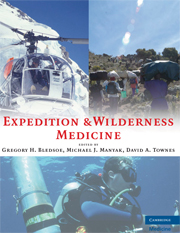Book contents
- Frontmatter
- Contents
- Contributors
- Foreword
- Preface
- Acknowledgments
- PART I EXPEDITION PLANNING
- PART II EXPEDITIONS IN UNIQUE ENVIRONMENTS
- PART III ILLNESS AND INJURIES ON EXPEDITIONS
- 24 General Medical
- 25 The Diarrhea of Travelers
- 26 Malaria: Diagnosis, Prevention, and Treatment for the Traveler
- 27 Wild Animal Attacks and Injuries
- 28 Snake and Arthropod Envenoming
- 29 Hazardous Marine Life
- 30 Expedition Toxicology
- 31 Environmental Injuries
- 32 Penetrating and Explosive Wounds
- 33 Drowning and Submersion Injury
- 34 Evaluation and Acute Resuscitation of the Trauma Patient
- 35 Principles and Practice of Expedition Wound Management
- 36 Expedition Eye Injuries and Disorders
- 37 Dental Medicine on Expedition
- 38 Foot Injuries
- 39 Expedition Orthopedics
- 40 Expedition Self-Rescue and Evacuation
- 41 Aeromedical Evacuations
- APPENDIX The Expedition Medical Kit
- Index
24 - General Medical
from PART III - ILLNESS AND INJURIES ON EXPEDITIONS
Published online by Cambridge University Press: 05 March 2013
- Frontmatter
- Contents
- Contributors
- Foreword
- Preface
- Acknowledgments
- PART I EXPEDITION PLANNING
- PART II EXPEDITIONS IN UNIQUE ENVIRONMENTS
- PART III ILLNESS AND INJURIES ON EXPEDITIONS
- 24 General Medical
- 25 The Diarrhea of Travelers
- 26 Malaria: Diagnosis, Prevention, and Treatment for the Traveler
- 27 Wild Animal Attacks and Injuries
- 28 Snake and Arthropod Envenoming
- 29 Hazardous Marine Life
- 30 Expedition Toxicology
- 31 Environmental Injuries
- 32 Penetrating and Explosive Wounds
- 33 Drowning and Submersion Injury
- 34 Evaluation and Acute Resuscitation of the Trauma Patient
- 35 Principles and Practice of Expedition Wound Management
- 36 Expedition Eye Injuries and Disorders
- 37 Dental Medicine on Expedition
- 38 Foot Injuries
- 39 Expedition Orthopedics
- 40 Expedition Self-Rescue and Evacuation
- 41 Aeromedical Evacuations
- APPENDIX The Expedition Medical Kit
- Index
Summary
INTRODUCTION
The majority of this text is dedicated to medical problems that are encountered during expeditions typically in remote, extreme, and politically unstable environments. In reality, many of the medical problems that arise during expeditions are less “exotic” and medical personnel should be prepared to treat a wide variety of more “common” medical problems as well.
When common medical problems do occur, they may represent new, acute illness or exacerbation of chronic disease. In either case, due to limited resources, during an expedition, evaluation and treatment may differ from that offered in traditional care settings. It is thus important to understand when on-site treatment may be appropriate and when evacuation of an ill or injured individual is necessary.
A comprehensive discussion of all possible medical problems that might occur during an expedition is beyond the scope of any single text. Rather, this chapter discusses some of the more common medical problems that could occur during expeditions and that may be treated by on-site medical personnel. In addition, several less common medical problems that are not covered elsewhere in the text are included. Medical problems such as myocardial infarction that may be relatively common but often require evacuation and treatment beyond the scope of on-site medical personnel are not included.
ALLERGIC REACTIONS
During an expedition, it is likely that individuals will be exposed to allergens different from those in their home region. Allergic reactions range from very mild to lifethreatening, including allergic rhinitis, sinusitis, reactive airway disease, urticaria, angioedema, and anaphylaxis.
- Type
- Chapter
- Information
- Expedition and Wilderness Medicine , pp. 343 - 351Publisher: Cambridge University PressPrint publication year: 2008



